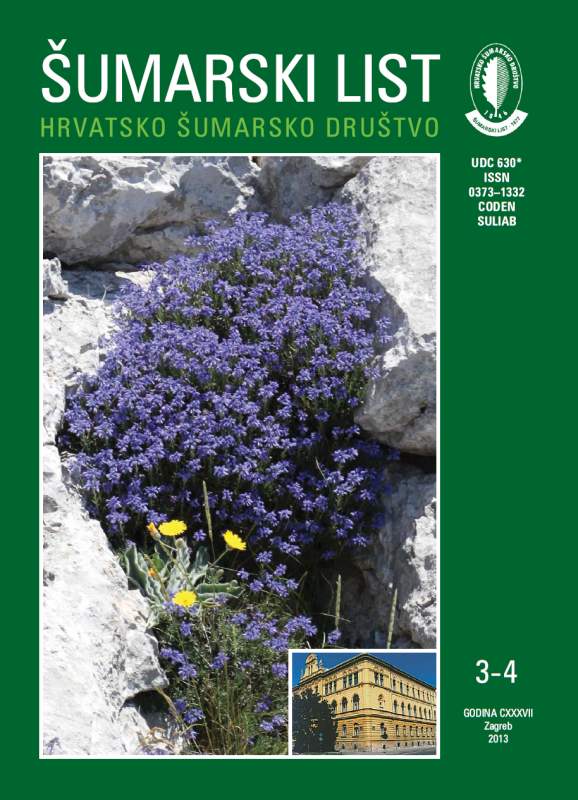
broj: 3-4/2013
pdf (7,8 MB) |
|
||||||||||||||
| RIJEČ UREDNIŠTVA | ||
| Uredništvo | ||
| WHERE DID POLITICALLY BASED PERSONNEL RECRUITMENT AND NON-MARKET MANAGEMENT LEAD US pdf HR EN | 133 | |
| IZVORNI ZNANSTVENI ČLANCI | ||
| Andrej Rozman, Alen Vajdetič, Jurij Diaci | UDK 630*234 (Abies alba Mill.) (001) | |
| A PROTECTED SILVER FIR (Abies alba Mill.) STAND IN SECONDARY SUCCESSION ON A FORMER PASTURE IN POLJANSKA DOLINA, SLOVENIA pdf HR EN | 135 | |
| Abstract: Silver fir (Abies alba Mill.) is regarded as a typical climax species susceptible to environmental change. We analyzed a protected silver fir stand growing in an unusual combination of conditions: The stand is in secondary succession and is located at low elevation on limestone substrate. Stand history was revealed by an old military map and stand structure, the radial growth of dominant trees, and tree regeneration were sampled. In addition, five characteristic relevés were taken according to the standard Braun-Blanquet method. The results confirmed that the stand originated from secondary succession; however, fir vitality and dominance as well as stand structure, including regeneration, suggested long-lasting stadia of almost pure silver fir (77 % of the growing stock). The growth pattern of dominant trees and large age variability of fir indicated that the stand did not originate from a completely open space. It is likely that fir gradually colonized the pioneer forest from neighboring stands. The stand was characterized by a high volume of live trees (773.6 m3 ha–1) and a low share of dead trees (4.1 %) in the growing stock. The most similar associations in terms of floristic composition are a secondary association Asperulo-Carpinetum betuli M. Wraber 1969 and a hornbeam-fir association (Abio albae-Carpinetum betuli Marinček 1994). This study shows that fir can form almost pure stands during secondary succession of abandoned pastures on some sites and therefore expands the prevailing view that silver fir decline throughout human history has been due to anthropogenic influences. Due to the complex interactions between silver fir, its competitors, environmental factors, and human-induced disturbances, additional research is needed to support the conservative management of silver fir in decline. Key words: total forest reserve; secondary succession; Abies alba; Picea abies; stem exclusion phase; silver fir decline and expansion | ||
| Drago BRUMEC, Črtomir ROZMAN, Marjan JANŽEKOVIČ, Jernej TURK, Štefan ČELAN | UDK 630*10+156 (001) | |
| AN ASSESSMENT OF DIFFERENT SCENARIOS FOR AGROFORESTRY ENVIRONMENT REGULATION OF DEGRADED LAND USING INTEGRATED SIMULATION AND A MULTI-CRITERIA DECISION MODEL – A CASE STUDY pdf HR EN | 147 | |
| Athanasios STAMPOULIDIS, Elias MILIOS*, Kyriaki KITIKIDOU | UDK 630*23 (Juniperus excelsea M. Bieb.) (001) | |
| THE REGENERATION OF PURE Juniperus excelsa M. Bieb. STANDS IN PRESPA NATIONAL PARK IN GREECE pdf HR EN | 163 | |
| Miloš Koprivica, Bratislav Matović, Snežana Stajić, Vlado Čokeša, Đorđe Jović | UDK 630*814+524+537 (001) | |
| DEAD WOOD IN MANAGED BEECH FORESTS IN SERBIA pdf HR EN | 173 | |
| PRETHODNO PRIOPĆENJE | ||
| Kristijan Tomljanović, Marijan Grubešić, Dean Konjević, Zlatko Tomašić | UDK 630*156 (Perdix perdix L.) | |
| SUCCESS OF RELEASING AND REINTRODUCING GREY PARTRIDGE (Perdix perdix L.) INTO THE WILDERNESS FROM ARTIFICIAL BREEDING IN HUNTING GROUND OF CENTRAL CROATIA pdf HR EN | 185 | |
| PREGLEDNI ČLANCI | ||
| Dinka Matošević, Ivana Pajač Živković | UDK 630*453+145.7 | |
| ALIEN PHYTOPHAGOUS INSECT AND MITE SPECIES ON WOODY PLANTS IN CROATIA pdf HR EN | 191 | |


